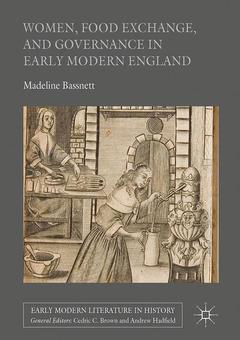Description
Women, Food Exchange, and Governance in Early Modern England, Softcover reprint of the original 1st ed. 2016
Early Modern Literature in History Series
Author: Bassnett Madeline
Language: English
Subjects for Women, Food Exchange, and Governance in Early Modern England:
Women, Food Exchange, and Governance in Early Modern England
Publication date: 12-2016
Support: Print on demand
Publication date: 12-2016
Support: Print on demand
Women, Food Exchange, and Governance in Early Modern England
Publication date: 06-2018
Support: Print on demand
Publication date: 06-2018
Support: Print on demand
Description
/li>Contents
/li>Biography
/li>Comment
/li>
This book is about the relationship of food and food practices to discourses and depictions of domestic and political governance in early modern women?s writing. It examines the texts of four elite women spanning approximately forty years: the Psalmes of Mary Sidney Herbert, Countess of Pembroke; the maternal nursing pamphlet of Elizabeth Clinton, Dowager Countess of Lincoln; the diary of Margaret, Lady Hoby; and Mary Sidney, Lady Wroth?s prose romance, Urania. It argues that we cannot gain a full picture of what food meant to the early modern English without looking at the works of women, who were the primary managers of household foodways. In examining food practices such as hospitality, gift exchange, and charity, this monograph demonstrates that women, no less than men, engaged with vital social, cultural and political processes.
1. Introduction.- 2. Providential Gifts and Agricultural Plenty: The Psalmes of Mary Sidney Herbert.- 3. The Milk of Wholesome Government: Elizabeth Clinton’ The Covntesse of Lincolnes Nvrserie.- 4. Prayerful Dining: The Diary of Margaret Hoby.- 5. The Quintessence of Good Governance: Protestant Hospitality in Mary Wroth’s Urania.- 6. Shaping the Body Politic: Mobile Food and Transnational Exchange in Urania.- 7. Epilogue.- Bibliography.- Index.-
Madeline Bassnett is Assistant Professor in the Department of English and Writing Studies at the University of Western Ontario, Canada. She has published numerous articles on the topics of food and early modern women’s writing. Her work has appeared in Modern Philology, The Seventeenth Century, Studies in English Literature 1500-1900 and Early English Studies.
Provides a unique approach to the current scholarly interest in women’s negotiations of informal power structures and their engagement with public and political life Suggests that we cannot gain a full picture of what food meant to the early modern English without looking at the works of women, who were the primary managers of household foodways Draws on a wide range of source material such as husbandry and housewifery manuals and dietaries
© 2024 LAVOISIER S.A.S.




